CDW Bundle
Who Really Owns CDW?
The ownership structure of a company is a powerful determinant of its future. For CDW Corporation, a leading technology solutions provider, understanding its ownership journey is key to grasping its strategic evolution. From its humble beginnings to its current status as a Fortune 500 company, the story of CDW SWOT Analysis is one of fascinating ownership shifts.
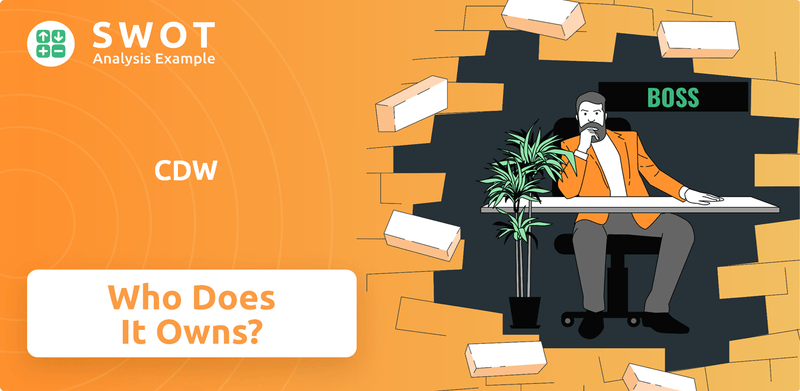
This exploration into the CDW ownership structure will reveal the key players who have shaped its trajectory. We'll examine the CDW company's history, including its founder and major shareholders. Understanding who owns CDW provides critical insights into its financial performance and strategic decisions, especially in the dynamic technology sector. We'll also touch upon whether CDW is a publicly traded company and how to buy CDW stock.
Who Founded CDW?
The story of CDW, a leading provider of technology solutions, began in 1984. It was founded by Michael Krasny, who started the company from his home in Buffalo Grove, Illinois. The initial investment was modest, with Krasny using his savings and credit cards to get started.
Krasny's entrepreneurial journey started with selling a used IBM computer through a classified ad. This experience highlighted the demand for computer hardware and software, which led to the formation of 'MPK Computers'. This was later renamed 'Computer Discount Warehouse', and eventually simplified to CDW. This evolution marked the beginning of a significant player in the technology solutions market.
The early ownership of the CDW company was primarily centered around Michael Krasny, the sole founder. While specific details about early equity splits or investors beyond Krasny's initial capital are not readily available, his vision was key. Krasny's focus on delivering technology solutions efficiently and cost-effectively to small and medium-sized businesses fueled the company's early growth. His direct sales model was a pivotal decision that contributed to the company's initial success.
Michael Krasny remained a significant shareholder, controlling approximately 22% of the outstanding shares before the 2007 acquisition. This demonstrates the founder's sustained commitment and influence over the company's direction. For more details on the company's history, you can read a Brief History of CDW.
- The company's early growth was driven by Krasny's vision to offer efficient and cost-effective tech solutions.
- Krasny's direct sales approach was a critical factor in the company's early success.
- Specific details about early investors beyond Krasny's initial capital are not readily available.
- Before the 2007 acquisition, Krasny held a substantial stake, underscoring his long-term involvement.
CDW SWOT Analysis
- Complete SWOT Breakdown
- Fully Customizable
- Editable in Excel & Word
- Professional Formatting
- Investor-Ready Format
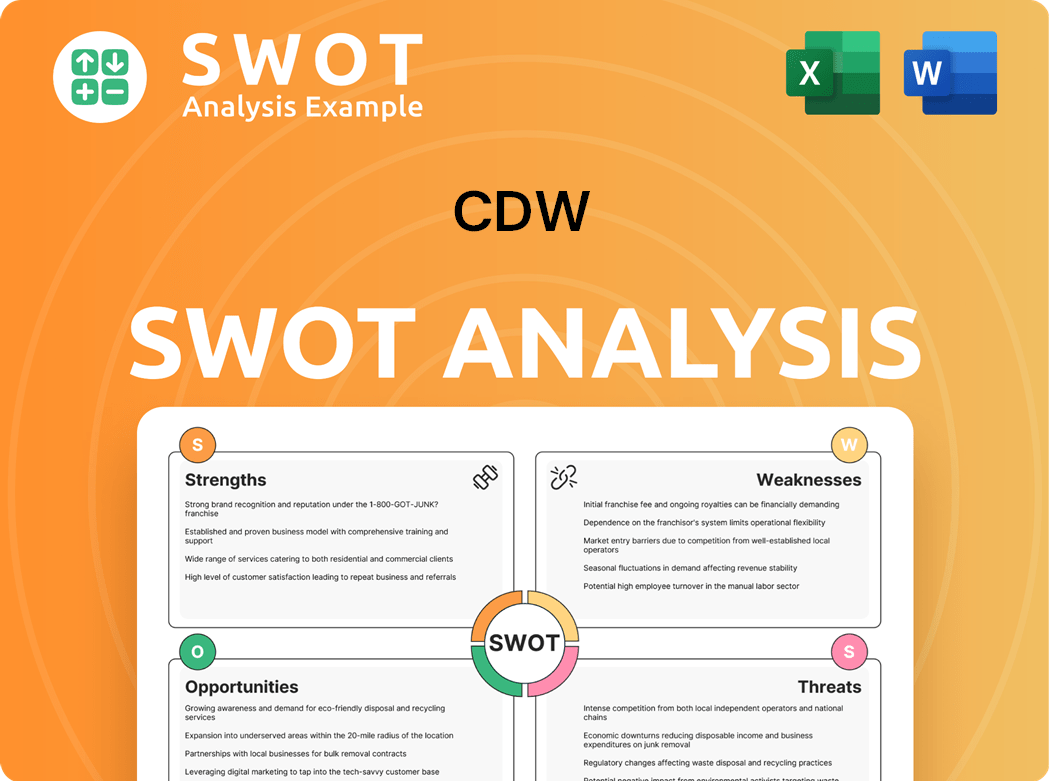
How Has CDW’s Ownership Changed Over Time?
The ownership of the CDW company, now known as CDW Corporation, has seen several key shifts. Initially, the company went public in 1993, trading on the NASDAQ under the symbol CDWC. This initial public offering (IPO) helped fuel expansion. A significant change occurred on October 12, 2007, when private equity firms Madison Dearborn Partners and Providence Equity Partners acquired the company for $7 billion, taking it private. Founder Michael Krasny, who held about 22% of the outstanding shares at the time, supported this move.
CDW returned to the public market on July 2, 2013, with an IPO on the NASDAQ under the name CDW Corporation. As a publicly traded entity, its ownership is now distributed among institutional investors, individual shareholders, and company insiders. As of May 2025, institutional investors hold a substantial majority, approximately 95.35% of the shares. This shift highlights the evolution of CDW's marketing strategy and overall business approach.
| Event | Date | Impact |
|---|---|---|
| Initial Public Offering (IPO) | 1993 | Provided capital for expansion and increased visibility. |
| Acquisition by Private Equity Firms | October 12, 2007 | Company taken private in a $7 billion deal. |
| Return to Public Market (IPO) | July 2, 2013 | Ownership shifted to include institutional investors and public shareholders. |
As of May 2025, major institutional shareholders of CDW Corporation include Vanguard Group Inc., holding 16,746,334 shares as of March 31, 2025, BlackRock, Inc., and State Street Corp. Insiders, including executives and directors, held approximately 0.36% of the shares as of May 2025. The significant holdings by institutional investors can greatly influence the company's strategic direction and market performance. Understanding the CDW ownership structure is crucial for anyone looking to invest in or analyze the CDW company.
CDW's ownership has evolved from a private to a public structure, with significant involvement from institutional investors.
- Institutional investors hold a majority stake, influencing strategic decisions.
- The company's history includes periods of both public and private ownership.
- Understanding the ownership structure is essential for evaluating the company.
CDW PESTLE Analysis
- Covers All 6 PESTLE Categories
- No Research Needed – Save Hours of Work
- Built by Experts, Trusted by Consultants
- Instant Download, Ready to Use
- 100% Editable, Fully Customizable
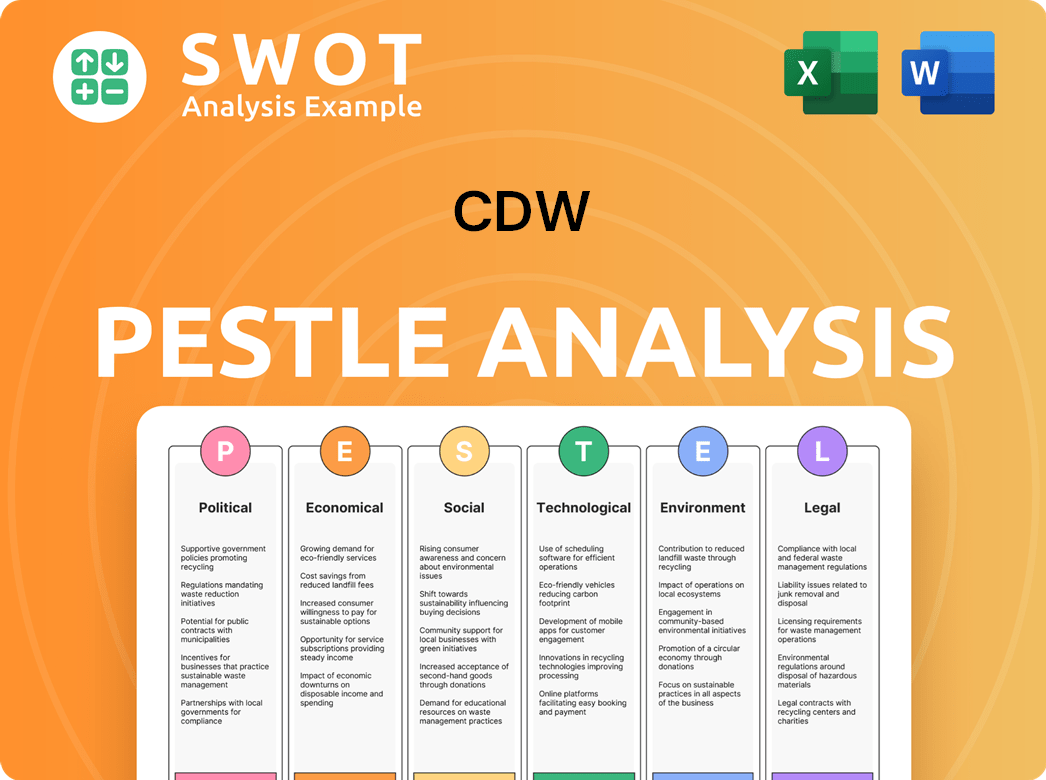
Who Sits on CDW’s Board?
The current board of directors at the CDW company plays a crucial role in overseeing management and strategic direction. They represent the interests of shareholders. The company's governing documents, including its Amended and Restated Certificate of Incorporation and Bylaws, outline the voting structure. Each holder of common stock is entitled to one vote per share on each matter submitted to a vote of stockholders. There are no cumulative voting rights.
For a quorum to be present at a stockholders' meeting, holders of shares representing a majority of the outstanding shares of capital stock entitled to vote must be present in person or by proxy. Actions typically require the affirmative vote of a majority of the votes cast, unless otherwise specified by law or the Certificate of Incorporation. Christine A. Leahy serves as Chair, President, and Chief Executive Officer. Insider ownership, including executives and board members, was approximately 0.36% as of May 2025. The board approved a quarterly cash dividend of $0.625 per common share to be paid on June 10, 2025.
| Board Member | Title | Shareholding (Approximate) |
|---|---|---|
| Christine A. Leahy | Chair, President, and Chief Executive Officer | Information Not Available |
| (Other Board Members) | Director | Information Not Available |
| (Other Board Members) | Director | Information Not Available |
In terms of governance, the classification of the board was set to terminate commencing with the 2021 annual meeting, with all directors serving a one-year term. Directors can be removed with or without cause upon the affirmative vote of stockholders representing at least a majority of the voting power of the company's then outstanding shares of capital stock entitled to vote generally in the election of directors. Shareholder proposals, such as one submitted in 2022 to permit written consent by shareholders, highlight ongoing discussions around shareholder rights and governance. Understanding
The board of directors oversees the company's management and strategic direction, representing shareholder interests. Each common stock holder is entitled to one vote per share. Directors serve one-year terms and can be removed by shareholder vote.
- The board includes representatives aligned with major institutional investors and independent directors.
- Insider ownership was approximately 0.36% as of May 2025.
- Shareholder proposals reflect ongoing discussions about governance.
- The company is publicly traded, allowing investors to buy
.
CDW Business Model Canvas
- Complete 9-Block Business Model Canvas
- Effortlessly Communicate Your Business Strategy
- Investor-Ready BMC Format
- 100% Editable and Customizable
- Clear and Structured Layout
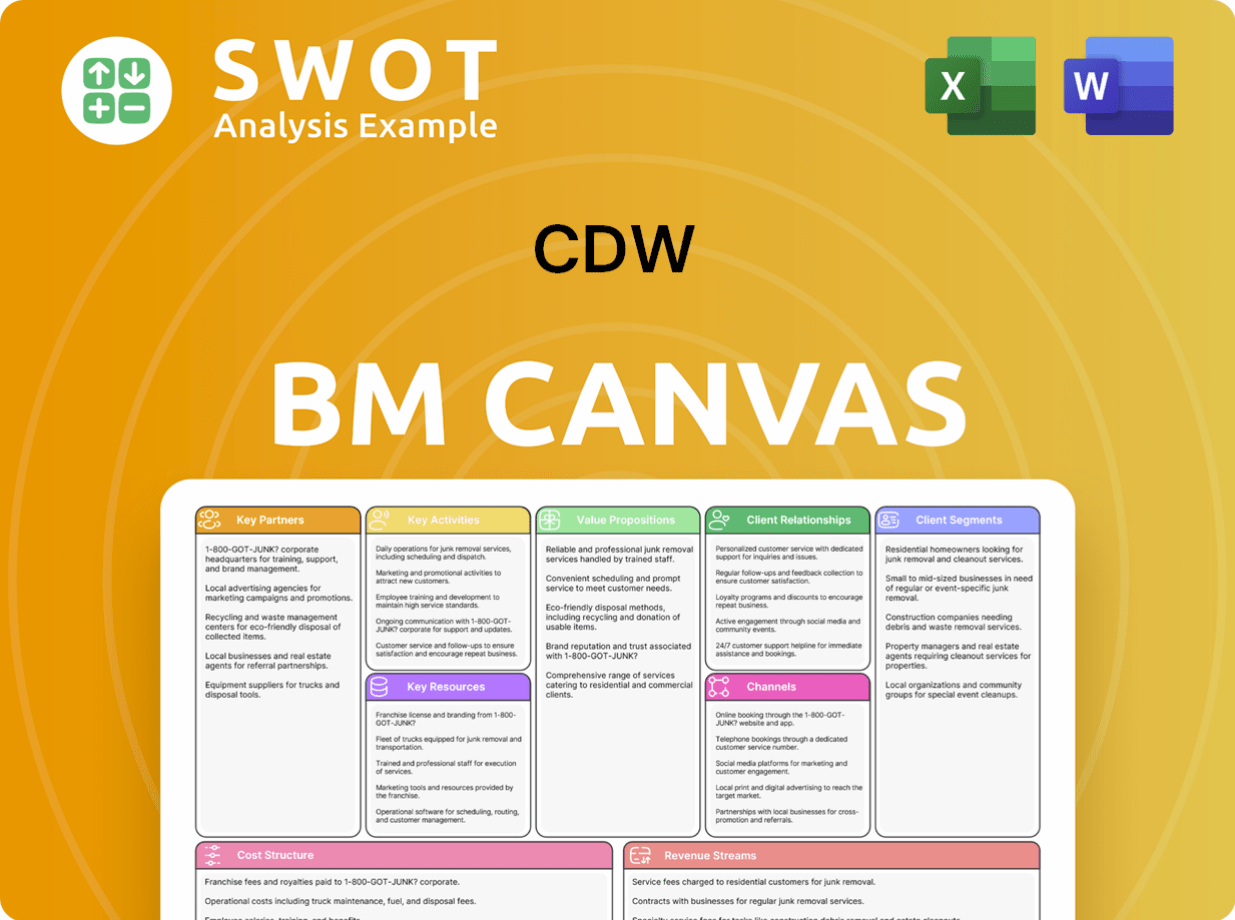
What Recent Changes Have Shaped CDW’s Ownership Landscape?
Over the past few years, the ownership structure of the CDW company has shown some interesting shifts. As of March 2025, institutional investors held a significant portion, increasing their stake from 93.81% to 95.35%. Mutual funds also increased their holdings, moving from 128.92% to 131.08%. Insider ownership saw a slight uptick, rising from 0.30% to 0.36% during the same period. These movements suggest strong confidence from major investors in CDW.
The company's financial performance in early 2025 has also influenced ownership trends. CDW reported net sales of $5,199 million for Q1 2025, a 6.7% increase compared to Q1 2024. Net income for the quarter was $224.9 million, reflecting a 4.1% year-over-year increase. Operating income also saw a rise of 10.2%, reaching $361 million. The CDW stock price increased by over 15% in May 2025, coinciding with a new reseller partnership with Smartsheet and positive Q1 earnings. You can find more information on the Growth Strategy of CDW.
| Ownership Category | March 2024 | March 2025 |
|---|---|---|
| Institutional Investors | 93.81% | 95.35% |
| Mutual Funds | 128.92% | 131.08% |
| Insider Holdings | 0.30% | 0.36% |
Capital allocation strategies, including dividends and share repurchases, are also key factors. CDW declared a quarterly cash dividend of $0.625 per share, payable on June 10, 2025. The company has increased its dividend nearly fifteen-fold since its IPO in June 2013, with eleven consecutive years of increases. In February 2025, the Board of Directors approved a $750 million increase to its share repurchase authorization. These actions highlight the company's commitment to returning value to shareholders and managing its capital structure. Industry trends, such as strategic mergers and acquisitions (like the 2021 acquisition of Sirius Computer Solutions, Inc. and the November 2024 merger/acquisition with Mission Cloud Services), continue to impact CDW’s market position and ownership dynamics.
Institutional investors increased holdings, indicating strong confidence.
Strong Q1 2025 results with increases in sales and net income.
Consistent dividend increases and share repurchase programs.
M&A activity and partnerships shape the company's landscape.
CDW Porter's Five Forces Analysis
- Covers All 5 Competitive Forces in Detail
- Structured for Consultants, Students, and Founders
- 100% Editable in Microsoft Word & Excel
- Instant Digital Download – Use Immediately
- Compatible with Mac & PC – Fully Unlocked
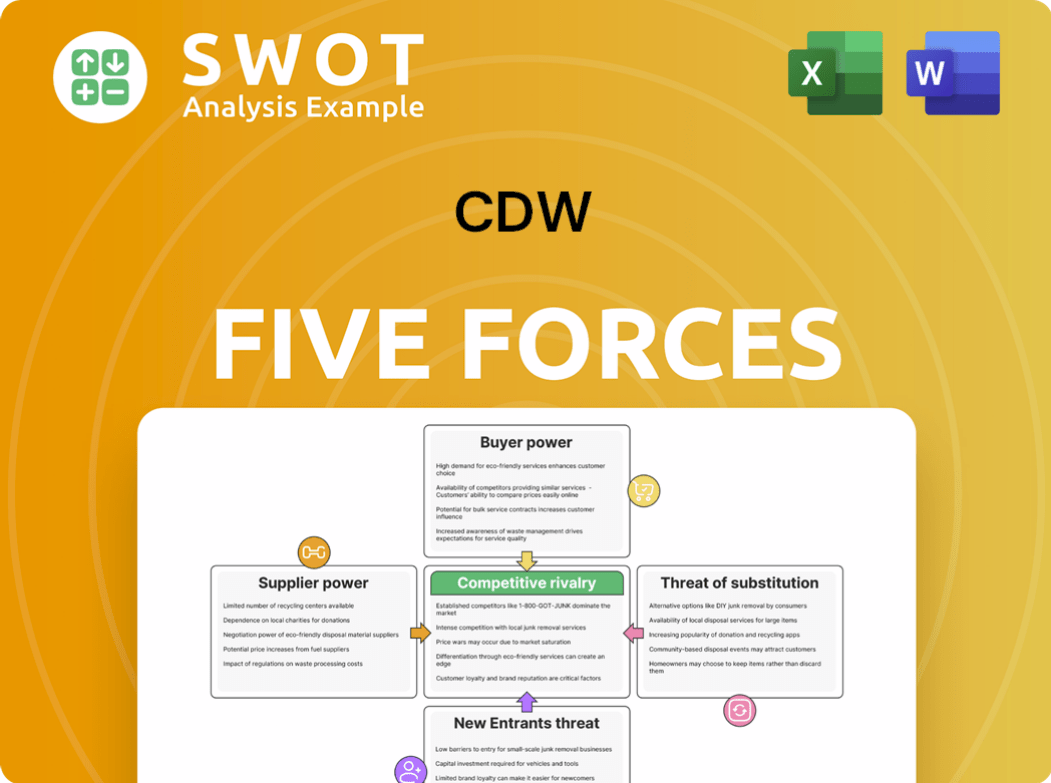
Related Blogs
- What are Mission Vision & Core Values of CDW Company?
- What is Competitive Landscape of CDW Company?
- What is Growth Strategy and Future Prospects of CDW Company?
- How Does CDW Company Work?
- What is Sales and Marketing Strategy of CDW Company?
- What is Brief History of CDW Company?
- What is Customer Demographics and Target Market of CDW Company?
Disclaimer
All information, articles, and product details provided on this website are for general informational and educational purposes only. We do not claim any ownership over, nor do we intend to infringe upon, any trademarks, copyrights, logos, brand names, or other intellectual property mentioned or depicted on this site. Such intellectual property remains the property of its respective owners, and any references here are made solely for identification or informational purposes, without implying any affiliation, endorsement, or partnership.
We make no representations or warranties, express or implied, regarding the accuracy, completeness, or suitability of any content or products presented. Nothing on this website should be construed as legal, tax, investment, financial, medical, or other professional advice. In addition, no part of this site—including articles or product references—constitutes a solicitation, recommendation, endorsement, advertisement, or offer to buy or sell any securities, franchises, or other financial instruments, particularly in jurisdictions where such activity would be unlawful.
All content is of a general nature and may not address the specific circumstances of any individual or entity. It is not a substitute for professional advice or services. Any actions you take based on the information provided here are strictly at your own risk. You accept full responsibility for any decisions or outcomes arising from your use of this website and agree to release us from any liability in connection with your use of, or reliance upon, the content or products found herein.